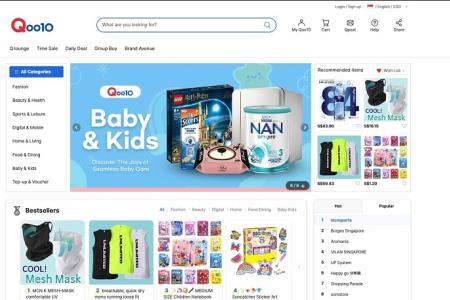Qoo10 owed online retailer $1.6m in sales payout as of July
When an online retailer began selling his products on e-commerce platform Qoo10 in August 2023, he did not bat an eyelid when it took 30 to 45 days for the platform to disburse his first payout, compared with about three to seven days for other e-commerce sites he was using.
But nearly a year later in July, payments owed to his business by Qoo10 had ballooned to about $1.6 million, as the platform’s payment delays exceeded two months and disbursements began trickling in, in smaller amounts.
The Singaporean, who wanted to be known only as Mr T and did not wish to divulge what he sold, pulled the plug on his Qoo10 shop this year in the middle of July, and filed a civil claim with the courts. He obtained a default judgment in October for Qoo10 to pay him what he is owed, after the e-commerce site failed to serve a notice of intention to contest or not contest the claim.
Mr T, who added that he had borrowed nearly $1 million from banks, friends and relatives to pay his suppliers, said: “I am not holding out hope that I will get much, or any, of my money back from Qoo10... By this point, I just want closure because it’s been so stressful.”
That closure might be on the horizon for Mr T, after the Singapore High Court found Qoo10 to be insolvent and ordered it to be wound up on Nov 11, with liquidators appointed to take over the management of the company.
Korea Culture Promotion (KCP), a gift certificates vendor in South Korea, had sought to wind up Qoo10 over nearly 76 billion won (S$72.4 million) in unpaid debt.
Like Mr T, other vendors who are owed payments by Qoo10 told The Straits Times they are resigned to not recovering the bulk of what they are due. They said they will submit their proof of debt to Qoo10’s liquidators and wait for them to arrange a creditors’ meeting.
At the court hearing for the winding-up application on Nov 11, KCP’s lawyer Chua Beng Chye, who is Rajah & Tann’s deputy head of restructuring and insolvency, said there were nine other civil suits against Qoo10 as at Nov 9.
Mr Richard Siaw, managing director of law firm R.S. Solomon, said five businesses that are owed hundreds of thousands of dollars each in delayed payments from Qoo10 had approached his firm in August. They had waited for four to six months before taking legal action, as they had good relationships with Qoo10.
He said four of his clients have since been granted default judgments for their civil claims against the e-commerce site.
“While my clients had expected that Qoo10 would be wound up, they are disappointed nonetheless because now it really seems like there is very little left (of Qoo10’s funds) to be salvaged. There is not much our clients and other creditors can do except to file a proof of debt with the liquidator when the time comes, and see how much they can recover,” added Mr Siaw.
Warning signs were there
Vendors said there were signs that Qoo10 was in trouble back around end-2023.
Mr T said that Qoo10 began to disburse monthly payments to his company across three separate payments of smaller amounts, rather than as one lump sum, around November and December 2023. He also said that in April 2024, the platform extended its payout period up to 60 days.
However, Mr T said he continued selling his products on Qoo10 because sales were brisk on the site, and while payments were slightly delayed, he always ended up getting paid by the platform.
“In hindsight, there were all these red flags I should have spotted, but I kept believing Qoo10’s explanations for every delay and was too patient with them. It’s a painful lesson for me,” said Mr T, who has been running his business for 12 years.
Buyers who had bought products on Qoo10 as recently as August told ST they have accepted they will not be able to recover money stored in the form of vouchers or Q*coins, Qoo10’s digital tokens.
Ms Wei Xin, who wanted to be known only by her first name, said she had been buying skincare products from Qoo10 since 2020, but stopped when she read news about the company’s troubles in July.
The 22-year-old university student shared that she contacted Qoo10 in August about $70 worth of Q*coins in her account, which had been credited as a refund for a previous purchase. While a customer service officer initially promised to look into whether she could withdraw the Q*coins, her follow-up e-mails went unanswered, and she believes she will not get her money back.
The Consumers Association of Singapore said it is engaging Qoo10 to resolve the 50 complaints received between Aug 1 and Nov 11 about delayed or undelivered orders and failure to withdraw money from the platform’s e-wallet system.
Dr Lau Kong Cheen, associate professor of marketing at the Singapore University of Social Sciences, said that Qoo10’s “weak financial foundation” was brought to light when the firm’s group chief executive Ku Young-bae was accused of fraud and embezzlement by South Korean prosecutors back in July.
This highlighted the firm’s poor financial management, especially in cash flow, said Dr Lau.
He added that the company has struggled to compete with other e-commerce platforms, even though Mr Ku claimed during a South Korean parliamentary hearing in July that the majority of Qoo10’s funds were spent on marketing.
Dr Lau said: “Customers have gained trust and also loyalty to platforms such as Lazada, Shopee, and Amazon with their high level of engagement that draws customers to make purchases.”
Associate Professor Ben Charoenwong from Insead Singapore said that Qoo10 “exemplifies” how the post-Covid-19 e-commerce boom may have masked fundamental vulnerabilities in digital marketplace business models, with the rapid expansion in online shopping creating pressure for aggressive growth.
Prof Charoenwong said: “As realised sales started to slow down, (Qoo10) became increasingly dependent on supplier financing to stimulate business activity – essentially using vendors as a source of working capital through delayed payments and gift certificate arrangements.”
Get The New Paper on your phone with the free TNP app. Download from the Apple App Store or Google Play Store now


